Barb Winters's Blog, page 4
July 15, 2024
Missed Messages: Lies & Truth About Sex
I’m thrilled to introduce my friend Lori Kuykendall. Lori has 30 years of experience in community health education, focused on working with schools and sex education curriculum and policy. She has a wealth of knowledge and loves sharing with parents. She’s here to share about the messages our children receive and how we can help them understand the truth about sex.
Today’s youth are living in an over-sexualized culture. Sexual images and pressure and misinformation come at them from all sides. Pornography is pervasive and is often called “the new sex education.” What they see and hear about sex can’t not have an impact on what they do with sex. As parents, we have the great challenge of helping them navigate through the cultural “garbage,” to know what is true and what is not, and to have the skills and support needed to live by truth. We need to be intentional to impart in relevant and receivable ways the truths they need to put into practice and stand strong through the storms of life.
Let’s work together to impart key “missed messages”- exposing the lies and replacing them with life-giving truths. We will see that the predominant cultural lies seek to steal, kill, and destroy our young people. My hope is that we can greater proclaim the abundant life offered when we walk instead in truth.
Here then are a few of the biggest lies they are hearing, and truths they aren’t.LIE: Sex is just physical. TRUTH: Sex is whole-person bonding—physical, emotional and spiritual.The world has objectified sex, making it just about bodies, stripping it of its full purpose and beauty as set forth from the beginning of humanity. Sex is intended to be a physical, emotional, and spiritual bond shared between a husband and wife who’ve committed in covenant marriage to bond for life.
LIE: Sex is great with whomever, whenever, wherever, and however you wish. TRUTH: Sex (sexual activity) is designed for and best enjoyed within marriage only.Sex is promoted through music, movies, social media, and especially through pornography, often by actors and actresses paid to perform for a camera. Young people often experiment with sexual activity assuming their experiences will be the same, and for lots of reasons, it just isn’t. Outside the safe context of committed marriage, sex brings physical consequences (including pregnancy and STDs), and emotional and relational consequences in both the short and long term. Research continues to show that the people who are most sexually satisfied are those who have been married for a long time.
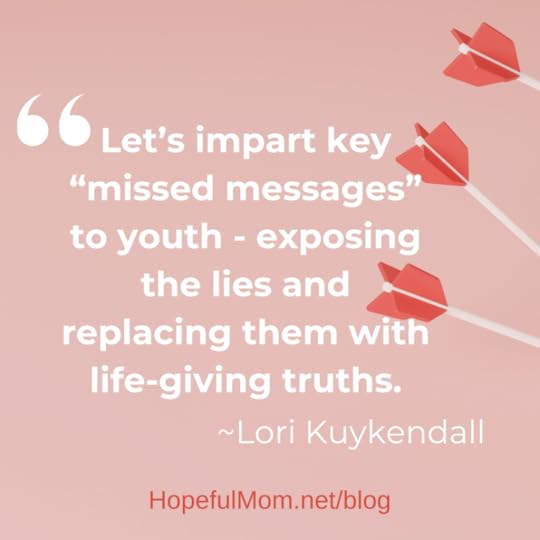 LIE: Everyone’s doing it.TRUTH: Most teens aren’t having sex.
LIE: Everyone’s doing it.TRUTH: Most teens aren’t having sex.The percentage of high school students who report they have “had sexual intercourse” has dropped steadily and significantly for the last 20 years. Now only 30% of them say that. That means 70% of high school students in the U.S. have NOT had sex. The research doesn’t show whether they’ve been involved with other kinds of sexual activity or pornography, but the fact that twenty years ago that number was 45.6% is significant.
LIE: You determine and can change your “gender identity.” TRUTH: Your sex was designed by your Creator at fertilization.The life of every human being begins at fertilization- when a female egg and male sperm unite. Inside that first joined cell is the unique DNA of a male or female- XX or XY. Every cell in their male or female body will contain that DNA- and be either male or female. While the tragic trend of “transgender ideology” has sold kids the idea they can change their gender, the truth is they cannot. An even more tragic lie is that a “fearfully and wonderfully made” boy or girl can be told he or she was “born in the wrong body.” May we from their earliest days affirm the wonder and beauty of the boys and girls who’ve been placed in our care.
LIE: Pornography is harmless. TRUTH: Pornography is dangerous and addictive.Pornography is easy to find but even more concerning, it comes to find our children. Multiple negative effects of pornography use have been documented, including increased anger, aggression, sexual experimentation, and violence. So also, has been its powerful addictive power (and for males ‘porn impotence’) that takes over even its youngest victims. Let’s courageously guard our children’s eyes and hearts and minds, and let’s help them to do so for themselves as they grow.
"Today's youth live in an over-sexualized culture. Let's expose the lies and impart the truth." Lori Kuykendall lists lies impacting the next generation. Missed Messages: Lies & Truth About Sex #fightthenewdrug…
Share on X
And the last one I’ll share is simply:
LIE: “My truth.”TRUTH: THE Truth!Our postmodern, anti-Christian world allows each person to define their own “truth.” Absolutes and objectivity have been replaced by feelings and self-determination (or, a better word, self-referentiality). Science and scripture have aligned for all of history, and will continue to do so, to define very clear truths that sustain life. They are the “rock” wise builders build on. Tragically the “sands” many around us are building on will wash away. May we clearly and confidently and compassionately make the truths known first in our homes and then in our influence beyond.
The way the U.S. Treasury trains its employees to recognize counterfeit currency, is not by training them what counterfeit money looks like. (They couldn’t possible train them in the endless variations that have been attempted.) Instead, they train them on each of the exact details of authentic currency. They want them to know the TRUE money so well they will recognize the FALSE money immediately. Likewise, may we train our children so well with the truths about sex that they will recognize the lies immediately.
If Hopeful Mom has been helpful for you and your family, please share its contents with others. Check out upcoming events where Barb is speaking. And be sure to check out the resource pages. We are always adding resources which may be helpful for you.
The post Missed Messages: Lies & Truth About Sex appeared first on HOPEFUL MOM.
July 1, 2024
What Parents Need to Know About Sextortion
Sextortion. One of several threats to our children. Parents, we should be aware of the danger and talk with our children.
What is sextortion?Sextortion is “extortion in which a perpetrator threatens to expose sexually compromising information (such as sexually explicit private images or videos of the victim) unless the victim meets certain demands.”[i] They may demand additional sexual content, sexual activity, or money. Victims often know their extorters. A current or former boyfriend or girlfriend may have an image the victim sent to them confidentially believing their interaction was personal and private. Then the offender uses the content against them.
Often, victims haven’t met their blackmailer in person. I’ve heard several stories of teens who have taken their own lives after they were sextorted online. One such teenage boy thought he was interacting with a teen girl on Instagram. Only it wasn’t a teen girl. And the predators were recording the “sexual encounter.” They then threatened to send the video to his friends and family if he didn’t pay them. He took his own life.
Boys and girls alike get caught in this scheme. These preteens and teens believe wholeheartedly they’re communicating with a peer or someone who loves them. There’s a certain level of trust that exists. The victim complies with a request under false pretenses. Then the threats begin. Sometimes offenders ask for money. Other times they ask for more images or videos which are then be uploaded to pornographic sites.
Both boys and girls can be targeted for sextortion, a form of blackmail. They are targeted in person by people they know and online. What Parents Need to Know About Sextortion #sextortion #socialmedia #parenting
Share on X
I attended a webinar last week with 500 other people, a record-breaking turnout for Survive and Thrive Advocacy Center, the organization who sponsored the event. The webinar covered social media, substance abuse, and gaming. Specifically, the speaker showed how these connect to sextortion and human trafficking. The number of people in attendance signaled to me how important this information has become and how anxious we are to figure out how to help the next generation.
Social MediaSocial media has been a topic in the news recently because the US Surgeon General called for warning labels on social media platforms “to alert users that the platforms can harm children’s mental health.”[ii] Whether or not we agree with the Surgeon General’s request, I think most parents want to protect their children from any type of harm. To that end, our children should understand the down side to social media—mental health issues, bullying, brain development problems, and potential exposure to predators who will attempt to lure them into trafficking or sextortion.
One of the comments in the webinar that caused me to pause and think was this: Low risk children can be caught in this behavior, too. Everyone has a vulnerability. Traffickers and predators are master manipulators. They know how to use vulnerabilities, whatever they may be.
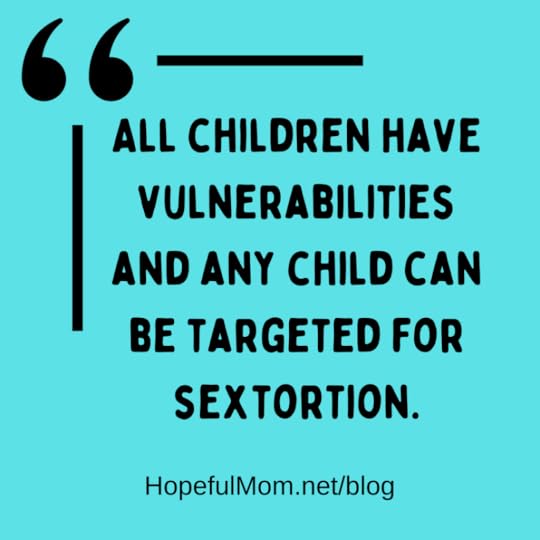
We tend to believe that only at-risk youth will be lured into sextortion or trafficking. At-risk includes youth who live in poverty or whose parents are divorced or are part of the lgbtqia2s+ community, along with a host of other situations. However, there’s a difference between at-risk youth and those who have a vulnerability.
We all have vulnerabilities, and they may change from day to day. A student may have a great home life, get good grades, and be the best on the soccer team. However, she may still feel insecure from time to time. An unfriendly remark could be a source of pain one day but not bother her a week later. A trafficker and sextortionist knows when to swoop in and what to say to manipulate her into his net.
All children have vulnerabilities and any child can be targeted. Therefore, we should do our best to keep our children safe from predators in person and online.
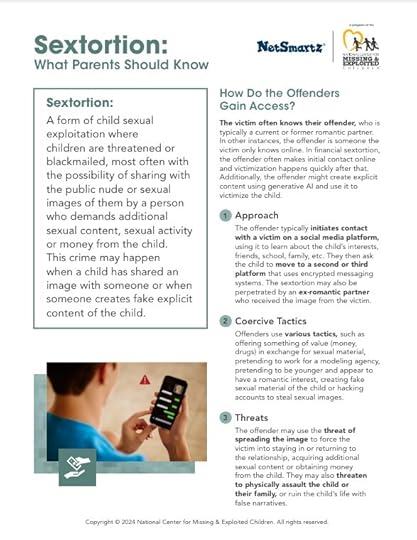
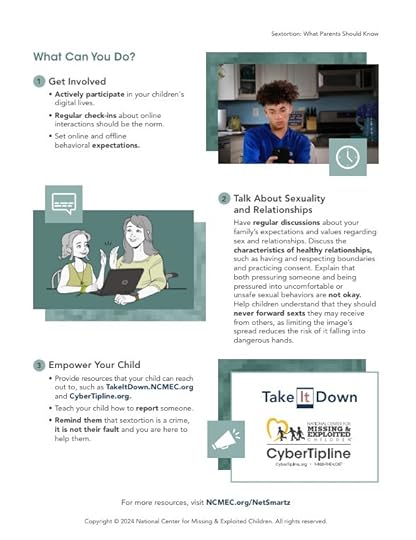 Safety MeasuresProtecting our children begins with the relationship. Cultivate a healthy relationship. Interact with your children. Be available. Have difficult conversations. Show them you’re willing to talk about anything and everything. Remind them frequently that you love them unconditionally, are available when they’re on top of the world and when they’re in trouble, and you are on their side.Talk about healthy relationships and how to spot healthy versus unhealthy interactions.Educate yourself on the latest social media apps and games. Before your child installs a new app or gets a new game, ask them about it. Try it out yourself.Use filters and parental controls. Enable “installing apps” restrictions on their phones.Monitor online activity.Tell your children to keep their social media platforms on private and not to share personal information, especially in a personal message.
Safety MeasuresProtecting our children begins with the relationship. Cultivate a healthy relationship. Interact with your children. Be available. Have difficult conversations. Show them you’re willing to talk about anything and everything. Remind them frequently that you love them unconditionally, are available when they’re on top of the world and when they’re in trouble, and you are on their side.Talk about healthy relationships and how to spot healthy versus unhealthy interactions.Educate yourself on the latest social media apps and games. Before your child installs a new app or gets a new game, ask them about it. Try it out yourself.Use filters and parental controls. Enable “installing apps” restrictions on their phones.Monitor online activity.Tell your children to keep their social media platforms on private and not to share personal information, especially in a personal message. HOMESCHOOL FAMILIES: I will be speaking at the Southeast Homeschool Expo in Atlanta July 26-27 on the following topics:
Helping the Next Generation Navigate Healthy RelationshipsTackling Sensitive Conversations with ConfidenceMy Child Was Exposed to Pornography: Now What?“I Didn’t Mean to Do That” – for TeensI hope to see you there!
If your organization, church, or homeschool group needs a speaker, check out the speaking page at Hopeful Mom and send me an email.
“Remind them that sextortion is a crime, it is not their fault and you are here to help them.”[iii]
[i] https://www.merriam-webster.com/dictionary/sextortion
[ii] https://www.washingtonpost.com/technology/2024/06/17/surgeon-general-social-media-warning-labels/
[iii] https://www.missingkids.org/content/dam/netsmartz/downloadable/tipsheets/sextortion-what-parents-should-know.pdf
The post What Parents Need to Know About Sextortion appeared first on HOPEFUL MOM.
June 17, 2024
Friend or Fan? Dawg or Dog? Which Are You?
I met Ken Anderson a few months ago and instantly knew he was a good guy and would be a great friend—one like he describes in this post. He has a heart for college students who struggle with pornography and has a fabulous program to help them. In this post, Ken helps us parents understand the difference between a dawg (true friend) and a dog (more of a fan). As parents, we want to lean toward being a true friend to our children, rather than a fan. Great words of wisdom.
Pepper is her name and pooping anywhere other than outside is her game. At least that’s been the case lately. I love our 4-year-old pit mix. I, and I alone. (My wife Liz is pretty much out on her.) She’s spunky, cute, funny, and always down to cuddle while I’m watching a show or reading a good book. (I’m still talking about Pepper, just to clarify; although, many of these adjectives also describe Liz). But, she’s also a good ol’ fashioned stinker. She steals food when we aren’t looking, sneaks in licks of our toddler whenever she can (he hates it, and screams), and mischievously takes off with any and all items that aren’t hers and chews them up without any regard for the owner of said item.
Truth be told, I despised Pepper when we first got her. Liz wanted a dog. I didn’t. And she was a bad dog. But in a tale as old as time, Liz soon started to find Pepper irritating, and I fell in love with her. While Liz can see every wrong Pepper commits, I struggle to see anything she does as anything but adorable (except for pooping in the house, of course).
Best Friend?Now obviously Pepper doesn’t fit the mold for the type of dog that could be your best friend. As cute as she is, she’s a nuisance (I’m not so blind with love that I can’t see a least some of the truth), but I want to process why the saying ‘A dog is man’s best friend’ likely came about. Dogs are loyal, affectionate, loving, and quick to forget our foibles. We can yell at them one minute, and the next they’re back in our laps, lovingly gazing into our eyes. When we get home from work, they bound with the enthusiasm of a late freight train to the door to welcome us home. With dogs, we can do no wrong. And this is why they shouldn’t be our best friends.
A Real FriendProverbs 27:6 says, ‘Wounds from a friend can be trusted, but an enemy multiplies kisses.’ A real friend tells you what you need to hear, not just what you want to hear, even when it hurts. How many friends do you have like that? In my experience they are few and far between. What makes them so valuable is that they love you so much they are willing to wound you with an important truth in the moment, even if it negatively affects your friendship for a time, to set you up for long-term success in the future. As Liz likes to say, we always need someone in our lives who ‘isn’t impressed with us.’ We need someone who knows our story, knows our mistakes, knows our ongoing issues, and who will push us to be better, all while loving us, encouraging us, praying for us, and rooting for us.
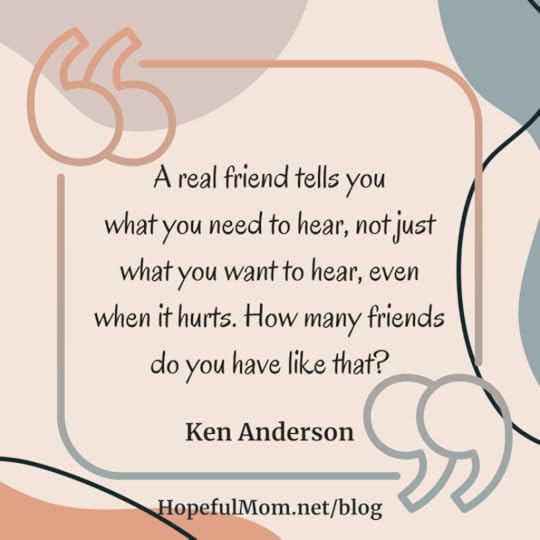
When it comes to sexual purity, as a mentor, I haven’t met many men who are in a good place with it. Most say they are ‘doing ok,’ and want to leave it at that. And I get it. I used to answer the same way (if I was even willing to acknowledge it was a struggle at all). In addition, some say they’re doing ‘pretty good,’ but when I ask them what ‘pretty good’ means, their standard seems much lower than God’s (Ephesians 5:3 ‘But among you there must not be even a hint of sexual immortality, or of any kind of impurity…’). Again, I can relate.
Be a Dawg, Not a DogSo, where does this leave us? In a world saturated with pornography, unwanted sexual behaviors, shame, and silence, we need more dawgs, and fewer dogs. Let me explain: I define “dog” as the type of person who always loves you and never challenges or tells you what you need to hear. Like a fan.
I define “dawg” as friends, peers, and mentors who always love you and are willing to challenge you, push you for your good, and tell you what you need to hear.
If the stats are true, most teens have seen pornography or will soon. Kids need our guidance. They need us to address it. ~ Ken Anderson, Friend or Fan? Dawg or Dog? Which Are You? #fightthenewdrug #onlinesafety #healthyrelationships
Share on X
If you’re a parent, grandparent, mentor, leader, or educator, you can be a dawg by doing a little barking and speaking up. If the statistics are true, most teens have seen pornography or will soon. Those looking to us, like our kids, need our guidance. They need us to address it. And we can do so by simply, humbly, and kindly starting the conversation: “Hey, I want to ask you something, and it might feel a little uncomfortable, but I really care about you and so I’m going to ask. And I want you to know that however you answer, I’m going to love you and care about you. Have you seen pornography?”
Will they answer? Will they run away? Will they ever talk to you again?! Honestly, I don’t know. But, I do know that silence can’t be the answer anymore if we truly care about them.
The goal is to start the conversation. Bark (in a loving way) just a little bit. That’s it. You can’t get to point B before you start at point A. Just start the conversation.
If you’d like some help either before or after starting the conversation, and need a dawg who knows what she’s doing, Barb Winters is a wonderful and encouraging guide you can turn to for help.
Let’s be dawgs.
If you suspect your child has a pornography problem or want more specifics on starting conversations with a child about pornography and its dangers, consider the What Do I Do Now? downloadable PDF at the shop page.
The post Friend or Fan? Dawg or Dog? Which Are You? appeared first on HOPEFUL MOM.
June 3, 2024
Ripple Effects of a Child’s Porn Use on Parents
“When my son’s indiscretions surfaced, I felt like I’d been punched in the gut and then kicked while down. I was unknowingly in a war zone, and when the bomb exploded, I was hit. The fallout of his conduct landed on me.”[i]
If you’re a parent, grandparent, or sibling of a child who watches (or watched) pornography, you’re likely hurt, sad, and/or mad. You may experience shame and guilt as well. That’s understandable.
Ripple effects of youth who watch pornography extend to those close by.
The following are potential ripple effects parents experience when a child watches pornography.
Parents GrieveGrief follows any type of loss, not just a physical death. The day I learned my son watched porn, the son I knew vanished. Within a matter of minutes, he became someone different. And I grieved the loss of the son I thought I knew, the loss of his innocence, and the loss of the young man he could have become.
I couldn’t have labeled my roller-coaster emotions at the time, but that’s what happened.
I entered the shock and denial stages of grief immediately. As time passed, I bounced around and through the other stages. Eventually—after quite some time—I landed on acceptance.
Parents Feel BetrayedBetrayal trauma, one of the ripple effects, is the damage caused by a betrayal, affecting the trust, safety, and security within the relationship.
In her book Intimate Deception: Healing the Wounds of Sexual Betrayal, Dr. Keffer states, “Trauma is a reaction of our bodies, minds, and emotions to a deeply distressing event. The earth-shattering incident changes the way we see people in our world and unravels our sense of safety. We can’t go back. We can’t erase what happened to us. Who we are and how we live significantly shift. Like a death, earthquake, or car crash, the event happens suddenly and changes us without warning, causing us to feel shock, denial, agony, terror, or helplessness.”
These reactions are typically short-lived but can be ongoing if the deception, betrayal, is ongoing.[ii]
Parents who learn they’ve been deceived for an extended period lose their sense of trust and experience triggers due to betrayal trauma.
Parents Struggle with How to View Their ChildI grew up in a culture that said people who snuck into the back end of the video store were creeps, the riffraff of society. Monsters. So, when I found out my son was one of those people who watched X-rated content, I couldn’t figure out how to picture him.
My kid was funny, creative, and personable. He loved life, talked incessantly, and had long conversations with us about theology, math, and the letter of the law. He was the only one of our four children who hadn’t lied to me. Except he had.
I couldn’t mesh these two schools of thought: My son’s amazing. My son’s a monster.How could that be? I struggled. My perspective disrupted my ability to interact with him.
That’s not a great way to parent a child.
Thankfully, as I researched the damaging effects on pornography and learned about brain science, the picture of my son changed. He wasn’t a monster; he was a victim of a billion-dollar industry that preys on children and a society that allowed it to happen.
Later, my perspective changed further. My son wasn’t a monster, and he wasn’t just a victim. He was a potential victor. That was life-giving.
Our children are human beings living in a fallen world, and they will sin. But that doesn’t mean they are bad people—or monsters.
Parents Think They’ve Broken Their ChildI thought I broke my child. If only I’d known how easily accessible pornography was. If only I’d purchased those filters we’d talked about. If only I’d nurtured my son differently.
Yes, I had failed in some areas. For those infractions, I sought God’s forgiveness and my son’s forgiveness.
On the other hand, the weight on my shoulders, the never-ending self-talk of failing and having broken my child never to be whole again—that self-talk was false guilt brought on by an enemy who likes to see us wallowing in self-pity and self-abasement.
What is your If only …?
If we get stuck here, constantly berating ourselves, neither we nor our child will heal.
As parents, we can accept responsibility for the part we played but choose not to allow false guilt to weigh us down.
When a child watches pornography, the ripple effects extend to parents. What are they and what can we do? Ripple Effects of a Child’s Porn Use on Parents #fightthenewdrug #pornharms
Share on X
“We’re apt to assume our children think about the ramifications of their actions and how those consequences affect those around them. If they’ve disregarded our advice, we believe they’ve purposefully rebelled against us. In our minds, we see our children rationally thinking through all their choices and picking the one that angers us the most because they don’t believe us and are out to get us.”[iii]
Yet, typically, their decisions have nothing to do with us. It’s not personal.
Curiosity or a need (real or perceived) motivates them. Then, once they’re trapped in the behavior, their cravings take over.
Recognizing their choices aren’t a personal attack frees us to forgive and parent from love, not fear or anger.
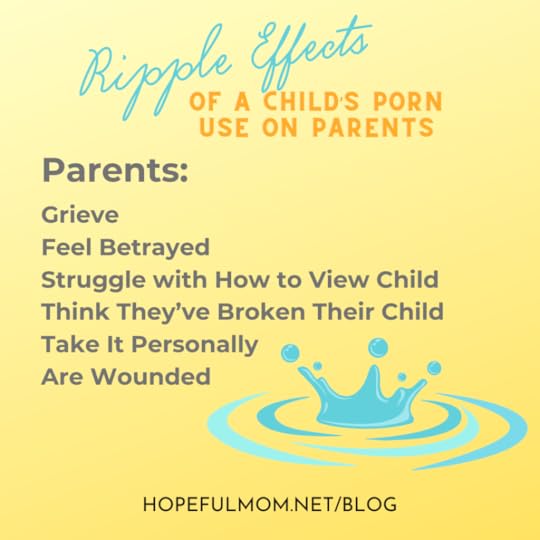 Parents Are Wounded
Parents Are WoundedThis is the bottom line. Our children aren’t the only ones hurting. We are wounded, too. We have an oozing gash affecting our life.
Thankfully, wounds heal.
Are you wounded? What ripple effects are you experiencing? Are there areas that need healing? I encourage you to evaluate your situation and tend to any hurts that still exist because of your child’s behavior.
*The above is compiled from a breakout session I taught recently at the Sexual Integrity Leadership Summit in Colorado Springs, CO. My greatest joy during the conference was having my daughter there as a friend and colleague. She let me borrow her computer. Love the stickers!

[i] Quote from Sexpectations: Helping the Next Generation Navigate Healthy Generations, p. 162
[ii] Keffer, Intimate Deception, p. 45.
[iii] Quote from Sexpectations: Helping the Next Generation Navigate Healthy Generations, p. 163-164.
The post Ripple Effects of a Child’s Porn Use on Parents appeared first on HOPEFUL MOM.
May 20, 2024
Kids Judge Their Bodies: What Can We Do?
Linda Stewart is back, continuing the conversation on how kids judge their bodies and how we and our children can learn to value the body. This topic is especially important since many preteens and teens learn to judge themselves based on what they see on social media and in pornographic videos. I learned so much in this post, and I’m sure you will find something valuable and applicable. If you haven’t already, read Kids Judge Their Bodies Part 1 here.
“How can I teach my kids to view theirs and others’ bodies without judgement?” The most effective way is probably the most difficult because it requires that we as parents, grandparents, and mentors deconstruct our own beliefs that affirm the body as a source of our value. If we can make the effort and begin this process so that we model the truth for kids, it can be so effective. We can demonstrate in our daily lives that every body is priceless because it expresses the irreplaceable and unrepeatable beauty of that person as a reflection of God. We can model this truth through our treatment of our own and others’ bodies.

Another practical approach to the value of the body is to affirm the body as an expression of who we are rather than an acceptable or unacceptable (depending on the day) accessory to who we are. Some examples:
"The body is an expression of who we are rather than an accessory to who we are." Kids Judge Their Bodies: What Can We Do? – guest post by Linda Stewart #hopefulmom #mentalhealth
Click To Tweet
– When a child comments about her body’s appearance, bring the conversation back to how her body expresses her person. One example is the story of a teen who expressed serious concern over scarring from a surgical procedure. While really listening to this teen and hearing his experience, I also offered a different perspective that brought the conversation back to his whole, embodied person: “Just think of all the scars and marks that your body collects over the course of your lifetime. One of the ways your body expresses who you are is by keeping track of some of the experiences along the way that make you, you.”
– Any time you receive an innocent comment from a young child about the size or shape of your body, any scars, shape of your tummy, or even the skin hanging on your arms, (please tell me I’m not the only one!) address your response to the body part mentioned and connect it with the way that part expresses something about you as a person with unrepeatable and inestimable value:
“No one else in the whole world has my arms. My arms carried you when you were little, hold you when you’re sick, and tickle you when you ask me to. My arms help me to express my love for you and others.”“No one else in the whole world has my stomach. My stomach digests my food so that I have good energy for work or play each day. My stomach tells me when I’m feeling nervous or excited or hungry or full.”– If you have or work with older children, make different connections. Gently but consistently challenge statements your teen makes about his body as the source of his value. Affirm your teen’s body as an unrepeatable and irreplaceable expression of who she is in those moments that she draws value from her appearance. For example:
“When I look at you, I see your incredible smile that makes people feel comfortable and loved!”“Please don’t talk negatively about yourself. When I look at you, I see how you love others, help strangers and friends, and how you laugh and joke the way only you can. You are literally one-of-a-kind. I love getting to know more about you and getting to know God better through you by experiencing how you see the world.”We hope our kids see themselves and others as whole embodied persons of inestimable value and worth. They are inundated with messages that convey the opposite; that value and worth are judged based solely on the body’s appearance. Instead of unintentionally affirming this damaging message, let’s work together to make sure kids understand the body’s appearance is an unrepeatable and irreplaceable expression of who we are as human persons made in God’s image. You give your child(ren) a profound gift any time you cast a bigger and more beautiful vision for the body as a priceless expression of each unrepeatable person.
If talking about our embodied persons in this way intrigues you, I wanted to let you know that this and other topics are covered in our blogs and podcasts.
Have you explored the shop page at Hopeful Mom yet? There are several new items available, including two downloadable booklets. These are perfect for the parent who has learned their child has been exposed to pornography.
The post Kids Judge Their Bodies: What Can We Do? appeared first on HOPEFUL MOM.
May 6, 2024
Mental Health and Youth
May is mental health awareness month.
We hear the phrase “mental health” often. So, let’s define it, see what affects it, and consider ways to help our children avoid mental health challenges.
What is mental health?“Mental health is a state of mental well-being that enables people to cope with the stresses of life, realize their abilities, learn well and work well, and contribute to their community.”[i] This “includes our emotional, psychological, and social well-being. It affects how we think, feel, and act, and helps determine how we handle stress, relate to others, and make choices.”[ii]
Mental health is an integral part of who we are. Therefore, looking after our mental well-being is necessary, not only to live our best lives, but also to avoid any instability affecting others.
What contributes to mental health issues in youth?According to the CDC, “in 2021, more than 4 in 10 (42%) students felt persistently sad or hopeless and nearly one-third (29%) experienced poor mental health.” Additionally, “more than 1 in 5 (22%) students seriously considered attempting suicide and 1 in 10 (10%) attempted suicide.”[iii]
Some risks that contribute to issues in youth include peer pressure, media influence, quality of home life (including living conditions), violence (including sexual violence and bullying), harsh parenting, socioeconomic problems, illnesses or disabilities, and stigma.[iv] Additionally, preteens and teens with low self-esteem or who drink, vape, take drugs, participate in sexual activity, send/receive nudes, or watch pornography have a higher probability of having mental health problems.
If our children aren’t equipped with proper coping skills and aren’t confident in their abilities, these risks may contribute to sadness, loneliness, depression, or self-harm. The preteen or teen may act out, develop a behavioral disorder or an eating disorder, have thoughts of suicide, or other problems.
Signs of IssuesThe following list of behaviors to look for was composed by SAMHSA (Substance Abuse and Mental Health Services Administration):
Feeling very sad or withdrawn or easily irritated for more than two weeksSeriously trying to harm or kill themselves, or making plans to do soExperiencing sudden overwhelming fear for no reason, sometimes with a racing heart or fast breathingGetting in many fights or wanting to hurt othersShowing severe out-of-control behavior that can hurt oneself or othersNot eating, throwing up, or using laxatives to make themselves lose weightHaving intense worries or fears that get in the way of daily activitiesExperiencing extreme difficulty controlling behavior, putting themselves in physical danger or causing problems in schoolUsing drugs or alcoholHaving severe mood swings that cause problems in relationshipsShowing drastic changes in behavior or personalityA drop in their school performance[v]A child’s mental stability can deteriorate over time or drop quickly. If you notice their disposition changing or see any of the above signs, talk with them. Click here for specific questions you can ask. If you continue to be concerned, consult a professional.
The crisis text line is 741741. The suicide & crisis lifeline number is 988.
Our children’s mental well-being is as important as their physical and intellectual well-being. Let’s be serious about nurturing it.
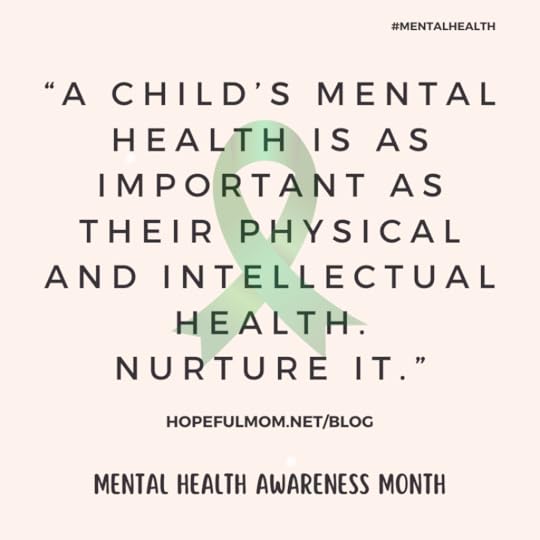 Nurturing Mental Health
Nurturing Mental HealthHere are a few ideas to nurture mental health, both yours and your child’s. Talk these over with your preteen and teen.
Set the phone aside. On second thought, monitor all time on screens. Too much screen time diminishes mental well-being.[vi]Practice gratitude. Verbally thank the people around you when they are kind. Consciously look for belongings, characteristics, surroundings, and physical characteristics you’re grateful for. Is the sun shining? Is there food in your refrigerator? Did someone enlighten you, inspire you or compliment you?Eat nutritious meals and drink water. Find a nutrition plan that works for you and/or your child. Avoid foods that lower immunity systems and eat foods that fuel the body. When we feel good physically, our mental well-being is better.Go outside. Fresh air and sunshine contribute to a healthier person.Interact with others. Call a friend, someone who makes you laugh and helps you feel good about yourself.Exercise. Movement is healthy.Breathe. Spend a few minutes concentrating on your breathing.Take short breaks throughout the day. Move away from your work. Engage in a different activity for a few minutes.Do something you love. Read a book. Color. Draw. Knit. Put a puzzle together. Lift weights. Go to a yoga class. Host a game night. Whatever boosts your spirit, spend a few minutes each day feeding that part of you.Get enough sleep. Lack of sleep contributes to sadness and depression. Our bodies require uninterrupted sleep.
Mental health is affecting our youth. This piece has 10 ideas to nurture mental health. Here's one: define limits and learn when to say "no." Mental Health and Youth #mentalhealth #hopefulmom
Click To Tweet
BONUS: Say “no.” Know your limits and stay within them. Adjust your schedule as necessary. When an emergency or trauma in your household arises, it’s okay to say no to the extra activities on your calendar. There is a time to pull back. But be sure not to isolate.
We hope these signs and suggestions are helpful. Remember that ongoing, honest conversations with your teens are important. It shows them you care and are available when they need help.
The second downloadable booklet in the My Child Saw Porn series, What Do I Do Now? is now available on Hopeful Mom’s Shop/Donate page. In this 23-page booklet, you’ll learn what action steps to take if you’ve learned one of your children saw porn. This booklet follows the first in the series, You Are Not Alone, also available at the Shop/Donate page.
[i] https://www.who.int/news-room/fact-sheets/detail/mental-health-strengthening-our-response
[ii] https://www.samhsa.gov/mental-health
[iii] https://www.cdc.gov/healthyyouth/mental-health/index.htm#:
[iv] https://www.who.int/news-room/fact-sheets/detail/adolescent-mental-health
[v] https://www.samhsa.gov/mental-health/how-to-talk/parents-and-caregivers
[vi] https://www.ncbi.nlm.nih.gov/pmc/articles/PMC6214874/
The post Mental Health and Youth appeared first on HOPEFUL MOM.
April 15, 2024
Kids Judge Their Bodies – Part I
My friend Linda Stewart is our guest for this post. She talks with us about how kids (and, let’s face it, us too) judge themselves based on their bodies. I learned some things in this post, and I hope you do, too! Linda co-wrote Before the Sex Talk: A Theology of the Body Approach for Parents and Mentors and is a board member of Sexual Integrity Leaders. (I’m speaking at their summit in May 2024. I highly recommend attending!)
We’ve learned to judge ourselves and our bodies. Messages that our value is based on our physical appearance seem to circulate in the air around us! We’ve also learned to judge others the same way, and we tend to pass what we’ve learned down to our kids, even if we don’t mean to. How can we stop passing these messages onto our children and replace the damaging thoughts that shape our and our kids’ self-assessments?
At THE Conversation website, Linda Noble and I established that we are embodied human persons, that the body expresses the person, and that the body and the person can’t be separated. It’s so important to integrate the value of the person with the person’s body. In what way is the value of my person related to the way I see my body?
Well, the perceived answer quickly becomes a personal one, so I’ll just speak from my own experience. I might be able to give a good Sunday school answer, “If I had a God-made price tag attached to my person it would read, ‘PRICELESS.’” Admittedly, it’s easier for me to say this about others. With an internal struggle, that would be invisible to you, I could admit that I am priceless because God sees me as priceless. But if I had to concede that this God-made price tag would necessarily be attached to my body that expresses my person, I would more likely cringe. I evaluate my body with a different kind of criteria and sometimes this means more to me than the value God claims that He has bestowed on me as a person. Throw aging and health related issues into the mix, and the criteria with which I tend to evaluate my body’s appearance drastically reduces the number of days that I can honestly assign a positive value to my own body and therefore my embodied self.
Culture encourages us to sculpt and enhance the appearance of our bodies in an attempt to feel better about ourselves to get others to notice us. Kids Judge Their Bodies – Part I #hopefulmom #mentalhealth
Click To Tweet
Culture tends to encourage us to sculpt and enhance the appearance of our bodies in an attempt to feel better about ourselves as well as to get others to notice and affirm us. Do you hear how that language reveals that we use our bodies in attempts to increase our perceived value? Social media and technology present us and our children with so many possible ways to put our physical bodies in front of an audience and seek affirmation that my body is good enough, or even to get agreement from others about the parts of my body that aren’t good enough. These options are on a continuum of less harmful to truly harmful. Many kids today are encouraging each other and celebrating each other with fire and heart emojis and comments about each other’s appearance. Some though, are bullied or shamed by friends or total strangers. Both experiences attach our kids’ value to their physical appearance, and the toll this takes can be subtle and nuanced. This teaches our children that their value is dependent on the judgment their body receives.
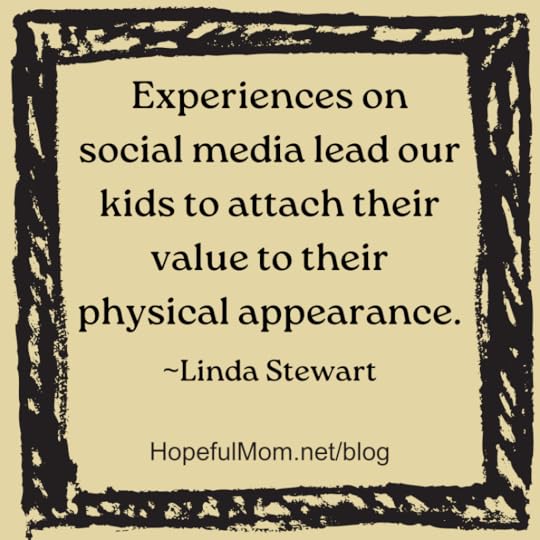
It can feel so good to be noticed, and when people notice us approvingly, even though it’s not possible for our inestimable value to go up, we often feel like it does. The reverse holds true as well, when I or someone else judge my appearance as not great, it feels to me like my value then plummets. But the good news is that our bodies have value WAY beyond how they measure up to cultural standards of beauty. Our bodies are God’s design for expressing our person made in the image of God.
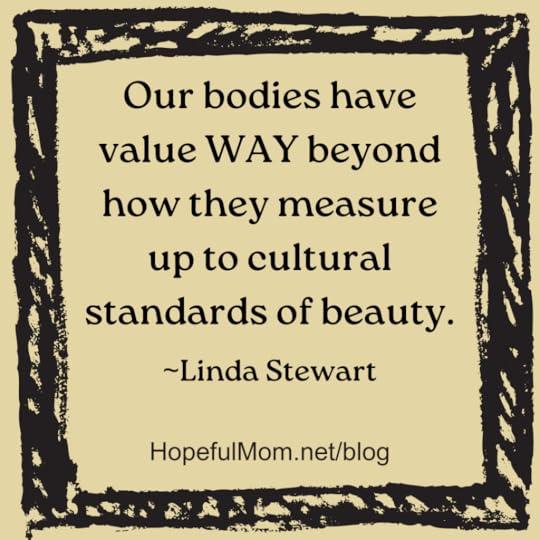
Each person – each embodied person – images God in an “irreplaceable and unrepeatable way.” Since I am a body-person, and my body and person are inseparable, my body must be judged as priceless (both by myself and by others). It expresses the beauty of my person as a reflection of God.
THIS truth is a gift that we can give our kids and the kids we work with. Together, we can help our kids reframe or even prevent them from internalizing the message that the body’s appearance is a source of their value and worth.
What are some practical ways to do this? We’ll explore this answer in Part Two.
Check out Barb’s upcoming speaking engagements. (You’ll find info regarding the Sexual Integrity Leadership on this page.) Subscribe at Barb’s YouTube channel! While you’re there, check out the Barb in Public playlist. You’ll find links to interviews, podcasts, and public speaking engagements.
The post Kids Judge Their Bodies – Part I appeared first on HOPEFUL MOM.
March 18, 2024
How to talk about AI and porn: a guide for parents
I’m thrilled to introduce you to Julia Daniels of Ever Accountable. She’s here to help us understand how to talk about AI and porn with our children. This is a powerhouse article full of fantastic resources.
While Taylor Swift’s deepfake porn debacle on Twitter caught the attention of national and international news, a growing number of similar news stories have been hitting the headlines regularly. In many cases, they involve AI-generated deepfake porn and minors. Parents and teens are alarmed as AI and porn is unleashing deadly dangers – creating a new wave of image based sexual abuse and sextortion. Even the American Academy of Pediatrics recently issued a warning.
What you don’t know about AI-generated porn could blindside you and your family. But clearly naming something dangerous starts destroying its power.
AI-generated pornSome call deepfake AI-generated porn “face-swapping”, but that is a bit simplistic. Sadly, the ways AI tools can be used are now almost limitless.
“In AI-generated child pornography, a user can use specialized software to make requests about the subject’s age, physique, and position. With repeated prompting, users can fashion AI-generated child pornography to meet their desires.” www.digitalbirdsandbees.com
Ways AI-generated porn endangers children
AI is creating a huge uptick in child sexual abuse materials (and real children are being exploited as a result).Children are using AI tools to produce AI-generated child sexual abuse materials- especially targeting girls as young as middle school. AI-generated porn further normalizes ‘anime’ style porn (also increasing the risk for teen anime fans discovering porn).Explosion of sextortion threats online, especially against teen boys“Girls frequently feel less-than because they know that some of their peers have the impression that they’re allowed to be thoughtlessly degrading. And further, they know that a portion of society values them only as objects. They walk through the world with that weight on their shoulders, and it’s up to all of us to help lift it.” Jessica Gross, The New York Times

When to talk about porn (and AI)
After listening to many moms, I’ve found my story is pretty common. I was utterly convinced that my daughter did not need a smart phone in middle school and early high school. That made me a bit of a “mean” mom, though I had a few mom friends who felt the same way.
However, I was totally unprepared for the onslaught of exposure to “soft porn” and highly sexualized content on other children’s unprotected devices. Unfortunately, every social media or gaming app with private messaging exploits vulnerable children.
As soon as your child is exposed to other children who use the internet, you need to have “Good Pictures, Bad Pictures” conversations. The time to start talking about body safety and respect as well as good pictures and bad pictures is pre-K and kindergarten.
The consequences of not talking about this topic early can be dire. As Heidi Olson, sexual assault nurse examiner notes: “from 2015 until now – a huge spike in the number of boys aged 11-15 committing sexual assault.”
6 tips to talk to your middle-school child (and teens) about AI and porn
Talk about AI as a powerful tool that can be used as a deadly weapon to hurt people such as creating porn.Clearly explain that making AI deepfake nude or sexual images is a form of cyberbullying and is illegal.Emphasize that images you put on the internet can live forever, harm others, and can result in criminal charges (even for teens) depending on your state laws.Using AI properly as a tool requires proper training and adult supervision. Tell a safe adult If someone makes sexual AI images and shows or tells you about this.Make a plan together for healthy use of technology – including a “mistake escape” plan.
"Talk about AI as a powerful tool that can be used to hurt people." One of six tips Julia Daniels of Ever Accountable offers to talk with middle-schoolers about AI and porn. How to talk about AI and porn: a guide for parents
Click To Tweet
Difficult news stories frequently crop up now – teens committing suicide due to an online sexting/sextortion leak or social media mistake. But you can potentially use these stories for a vital conversation starter! (If your teen confides suicidal ideations, the Mayo Clinic offers some helpful pointers.)
What if your child admits to an online mistake? Instead of shaming your child, assure them that you will love them and help them “no matter what”!
Ways of fighting back against online mistakes
Be okay with saying no to permitting social apps.Protect your children’s identity online on your own social media.Utilize resources for taking down nudes and legal means for fighting image-based sexual abuse. (listed below)Fight AI with an AI-powered porn blocker, plus teach online accountability – depending on your family’s current needs. (links below)At Ever Accountable, we strongly encourage open sharing of all online activity with our accountability app on unlimited devices. Our weekly accountability reports encourage regular conversations between parents and young teens about online safety.
If your child is already struggling with viewing online porn, our updated Bulldog Blocker app (powered by AI, ironically) blocks porn from being viewed, helping to break the cycle.
Help if your child is already a victim of AI-generated porn
Dealing with image-based sexual abuse is both challenging and traumatizing. Similar to being a victim of sex-trafficking, recovery may feel impossible at the moment. Assure your child that there is a beautiful life possible despite this event.
However, even if you feel powerless, there are a few immediate positive action steps you can take:
The National Center on Sexual Exploitation has a legal team ready to help victims of online sexual abuse. (Please save any evidence immediately.)Another resource is Cyber Civil Rights online safety center’s list of attorneys. Fight the New Drug has compiled this very helpful list of ways to fight back, practice self-care, and heal. Ask Google to take down images and hold their feet to the fire. Search for a trauma-based therapist for long-term recovery help.Please care for yourself and your child kindly. Your one and only life matters. If you’re reading this and it’s a rough day, you can talk to someone for FREE. Text HOME to 741741.
Conclusion:Yes, it feels like we’ve “outed” a conspiracy – the “Perfect Storm” online threatening a wholesome childhood. But armed with our loving support and guidance, our children can survive this digital onslaught and thrive. While no parent is able to protect their children from all online harms, being aware means you can immediately address these harms and mistakes. Even more crucial, you can begin helping your child heal from the damages. Finally, it’s important to empower other parents. Let’s band together, share vital information, and support each other in this storm.
Check out Barb’s upcoming speaking engagements. (You’ll find info regarding the Sexual Integrity Leadership in May and the Southeast Homeschool Expo in July on this page.) Subscribe at Barb’s YouTube channel! While you’re there, check out the Barb in Public playlist. You’ll find links to interviews, podcasts, and public speaking engagements.
The post How to talk about AI and porn: a guide for parents appeared first on HOPEFUL MOM.
March 4, 2024
You Matter
My son exited his bedroom and walked toward the front door.
“Are you leaving?”
Silence.
“Are you going to work?”
He turned to me, stared, then gave a quick nod.
“Okay. . . Have a great day!”
The door slammed.
I sighed. I felt invisible, unnoticed, and depleted.
Parenting a preteen or teen can be exhausting. Depressing even. And we may wonder if we really matter. Are our efforts worth it? Are we making a difference?
Even though your child may not express it, you are making a difference.
On your worst day, you matter. On the day your daughter disrespects you, you matter. On the day your son ignores you, you matter. And on the day you learn your teen fell prey to an addiction or habitual habit, propelling them down a wrong path, you matter.
Parents: Your Presence Matters. Your Voice Matters. Your Ideas Matter. Your Efforts Matter. You Matter #healthyrelationships #keeptalking #fightthenewdrug
Click To Tweet
Your Presence Matters – Teens may hide in their bedrooms or ignore us. But, even though they don’t show it or even realize it themselves, they need to know we are physically present. Be available. Listen intently. Pay attention. If a child treats you unkindly, politely redirect. When your feet want to flee, stay close. You are a necessary component in your child’s life.
Your Posture Matters – Our children are watching. Our mannerisms, facial expressions, and attitude are contagious. Our approach to life impacts those around us. Have meltdowns privately and remain calm in front of your children. Their behavior is not personal. They are finding themselves and need a safe place to both succeed and fail.
Your Voice Matters – How we state our position counts. Our voice inflection and rate of speech has an impact on our message. Speak softly. Respond kindly. Say “I love you” frequently.
Your Ideas Matter – Even when they roll their eyes or cut us off, they are listening. Treat them well, ask questions to help them think, offer advice, and be there whether they fall or prosper. Speak truth. Impart wisdom.
Your Efforts Matter – When they complain about our cooking, we can keep offering them food. When they grumble because we ask them to do chores, we can keep teaching them responsibility. When they break our rules, we can hold fast to our consequences. Their brains are still under construction, and our guidance is crucial.
Your Love Matters – When their friend backstabs, their bestie moves, or their romantic relationship crumbles, our love continues. Show them love. Teach them love. A well-placed hug or smile reminds them that they matter.
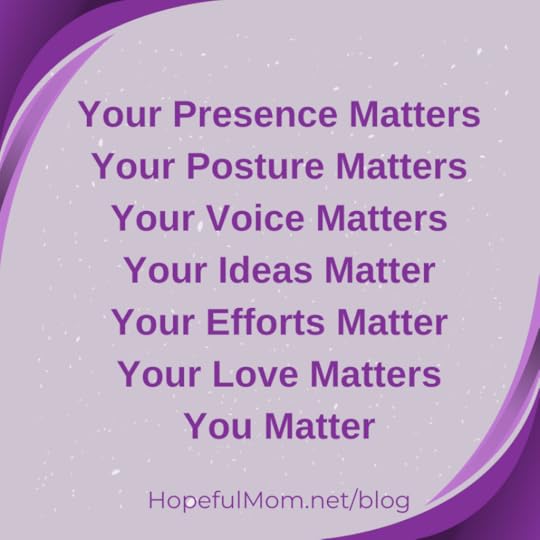
Your Existence Matters – Mom, Dad, Grandparent, Caregiver, Leader, Educator: You are special and unique. You are the only you that exists. You play an important role in your child’s life. You have a purpose. When no one else sees you or pays attention to your thoughts, you still matter. Keep trying. Keep loving your child. Keep talking. You’ve got this!
Friends – I’m excited to tell you that you can now shop and donate at Hopeful Mom. Check out the SHOP/DONATE page. I will be adding more products in the near future. My hope is to have mini-books in the form of PDFs available for purchase. Stay tuned! In the meantime, be sure to subscribe and follow me on social media. Oh – and subscribe at my YouTube channel. So much fun!
The post You Matter appeared first on HOPEFUL MOM.
February 19, 2024
A Millennial Talks About Internet Filters, Pornography, and Addiction
“I was first introduced to online sexting with strangers when I was 12 years old through an online video game on my computer.” Austin Couture, now 29, eventually developed an addiction. “I could not stop seeking out pornography and women to chat with online or the obsessive and compulsive masturbation that always went along with it. At one of my lowest points, I felt isolated, alone, confused, faulty and irreparably broken. I believed that I was an emotionless, guilt-ridden zombie that was forever cursed to live in despair with these sexual secrets.”[1] Austin and I met at a Sexual Integrity Leadership Summit and connected further when I was a guest on his podcast. I asked Austin to give us some insight from his perspective on addiction, talking, and using an internet filter. He had the following advice:
When it comes specifically to pornography, sexting, and devices, it’s a sad truth, but almost no device is safe, even if you have an internet filter on the device. Here’s how I got around filters in my home:
Video Game Consoles – I love video games! Most kids do. Thankfully, most consoles (i.e. Xbox and Playstation) have parental controls; however, there are some flaws to consider. Internet apps can be downloaded onto gaming consoles, but filters cannot be added. Therefore, a preteen or teen can download an app and be on a porn site within seconds. We also need to be careful of online multiplayer games. Other kids and adults intentionally try to reach children for sexual content or personal information through online games. Gaming communities have tried to curb this behavior and have banned accounts of players caught exhibiting criminal behavior, but it’s easy to create another account and be accepted back in.Smart TVs – Smart TVs are wonderful! I love a good weekend of binging a Netflex show. But most smart TVs allow access to apps and internet browsers. So, anyone can access pornography through the smart TV.Smartphones & Tablets – You may think that since you can add an internet filter to these devices they are safe. My parents thought so, too. Gaming apps connect with others for sex chatting and to share pornography or nude pictures. The “private mode” browsing rarely stops the user from viewing porn. Additionally, our kids can disable or get around internet filters without getting caught. For example, there are websites that can crack the 4 or 6-digit PIN of the screen time passcode to bypass locks you’ve put in place. One of the easiest ways I got around the blocks on my phone was by using random apps. A vast majority of the “Terms and Conditions” or “Privacy” sections on apps will take you to their website. Websites link to their social media page or the Google search engine. It’s easy to get to social media or Google to surf for porn. An internet filter may or may not catch this activity. Therefore, if you see your teen has been on an app for an excessive amount of time and it doesn’t make sense, you may question it.Laptops and Desktop Computers – Porn can be accessed through the internet on both Apple and Microsoft, even with screen monitoring. Some filters don’t work in “safe mode” or “private mode.” Additionally, there’s a plethora of sites not blocked by internet monitoring and filtering software in which the user can download videos and pictures straight to the computer. And, again, online video games can be an issue, as mentioned in #1.Podcasting Apps – Even though podcasts are audio only, erotic and adult-themed stories and talk shows are available through them. They can be accessed via an Amazon Alexa speaker as well.Video Streaming Sites – Even “safe” video sites and parental controls are not 100% secure. Be sure to monitor your children’s activities on these.Social Media – Preteens and teens easily find sexual images, videos, and more on social media. This is also where teens and adults connect with our kids and exchange personal information. Be careful with social media.It seems like nowhere is safe. As a sex and love addict, I can’t go anywhere without a potential trigger for my addiction, which seems unfair. The point is: there will always be a way for your children to access pornography and possibly be taken advantage of by strangers.
A Millennial Talks About Internet Filters, Pornography, and Addiction – How did he feel? How did he get around the internet filter his parents had? And how can you best protect your children? #fightthenewdrug #healthyrelationships
Click To Tweet
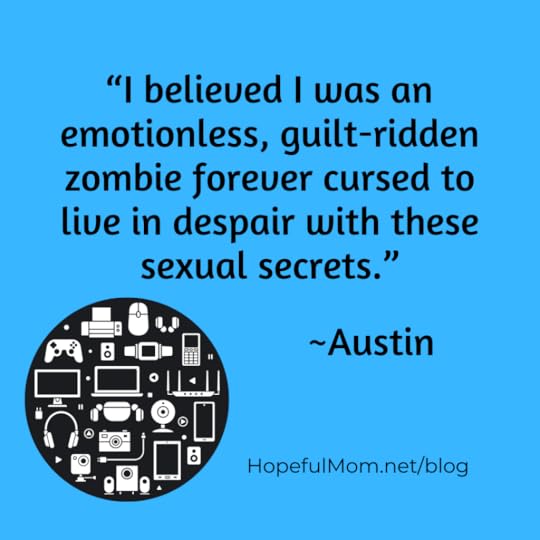
Barb here! Sometimes all this info can be a little scary. Our hope is to offer you information to empower you to parent well. Stay informed but don’t fret. Remember that your best line of offense and defense is ongoing, open, and honest conversations. You’ve got this!
[1] https://gentlepathproject.com/about-us/
The post A Millennial Talks About Internet Filters, Pornography, and Addiction appeared first on HOPEFUL MOM.



